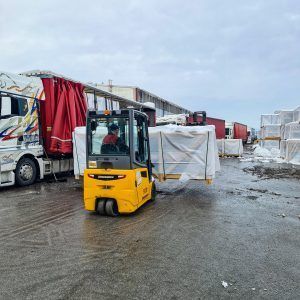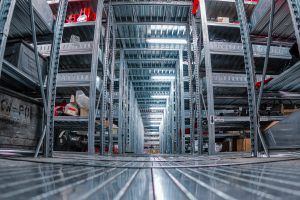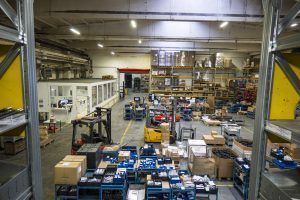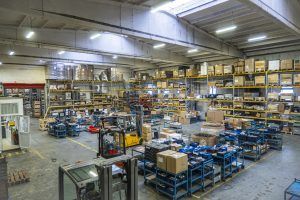
Logistics is the beginning and the end of a significant part of our production process.
Modern and successful companies need to continuously adapt their services and products to the changing demands, needs, and their customers’ wishes. One of the important success factors for companies is rapid adaptability to changes in the environment. Logistics plays a major role in achieving competitive advantage by managing the flow of goods and information and coordinating the time, physical and spatial needs between the sourcing and consumption of materials and the final production of machinery. Well-organized logistics in a company can significantly reduce operating costs and thus increase competitive advantage in the market.
The organisation of the logistics function is a major challenge, as it must constantly adapt to the (nowadays particularly chaotic) market conditions. It has to adapt to developments in the transport, purchasing, and sales markets, as well as to the political situation in the various parts of the market that are important to the company.
At SIP, we are located at the back of the factory. Logistics employs 18 of us. The department is divided into four areas, which are managed by Domen Mogel, who is in charge of the warehouse for technical material and spare parts, Domen Sitar who is in charge of the warehouse for finished products and accessories, Matko Robert manages the metallurgy department, Milojka Pirš Jerman manages the customs service, and the head of our family is Mirjana Pikl.
In logistics, we can’t work on stock, and not even with a delay. The dependence of other SIP departments on logistics does not allow us to miss one day’s work: for example, if we don’t make preparations for production, production will stop; if we don’t load the trucks, customers will be unhappy; if we don’t dispatch the spare parts packages, customers or even end-users will not be able to carry out the work that is necessary for them, and we would have unhappy customers; if we don’t unload the truck on the right time, we would have unhappy drivers, because everyone is in a hurry to move on. In short, all activities are part of the chain and are linked to each other.


So, in logistics, we make sure that the work runs smoothly: those in charge prepare the material for production on time, and others make sure that all the trucks are loaded. Part of the team makes sure that the material is received accurately and correctly. Others pick, declare, and pack the packages for our customers. The girls in the office take care of all the paperwork and are the hub of all the documentation. Every day we take care of the receipt books for technical material, spare parts, finished products, and accessories. We prepare documents for the material for production, for spare parts, for truck loads, we add the information needed by the warehouseman to the delivery notes we receive, we carry out various transfers from other warehouses, and we book the return of items that have been dismantled from the machines, finalizing delivery notes for finished products, spare parts, preparing postal waybills, issuing invoices, customs clearance, monitoring the handover of machines from preparation prior to shipment, entering data into tracking tables, ordering transport across Slovenia, abroad and liquidating invoices. Otherwise, the workload of the logistics is always heavier at the end of the month, when there are more machine dispatches than on other days, as we are chasing the last minutes for the current month’s dispatches.


In summary, logistics has a major impact on a company’s business. Therefore, investments in logistics, training of employees, purchase of new equipment, improvements to the IT system, and modernization of warehouses are necessary and create the conditions for more efficient logistics processes.












